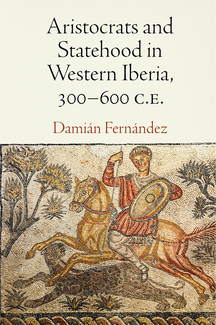Aristocrats and Statehood in Western Iberia, 300-600 C.E.
This article first appeared in ISAW Newsletter 20 (Winter 2018).
 Damián Fernández (ISAW VRS 2009-10), Aristocrats and Statehood in Western Iberia, 300-600 C.E. (Philadelphia: University of Pennsylvania Press, 2017).
Damián Fernández (ISAW VRS 2009-10), Aristocrats and Statehood in Western Iberia, 300-600 C.E. (Philadelphia: University of Pennsylvania Press, 2017).
In a distant corner of the late antique world, along the Atlantic river valleys of western Iberia, local elite populations lived through the ebb and fl ow of empire and kingdoms as historical agents with their own social strategies. Contrary to earlier historiographical accounts, these aristocrats were not oppressed by a centralized Roman empire or its successor kingdoms; nor was there an inherent conflict between central states and local elites. Instead, Damián Fernández argues, there was an interdependency of state and local aristocracies. The upper classes embraced state projects to assert their ascendancy within their communities. By doing so, they enacted statehood at the local level, bringing state presence to the remotest corners of Iberia, both under Roman rule and during the later Suevic and Visigothic kingdoms. (Penn Press)